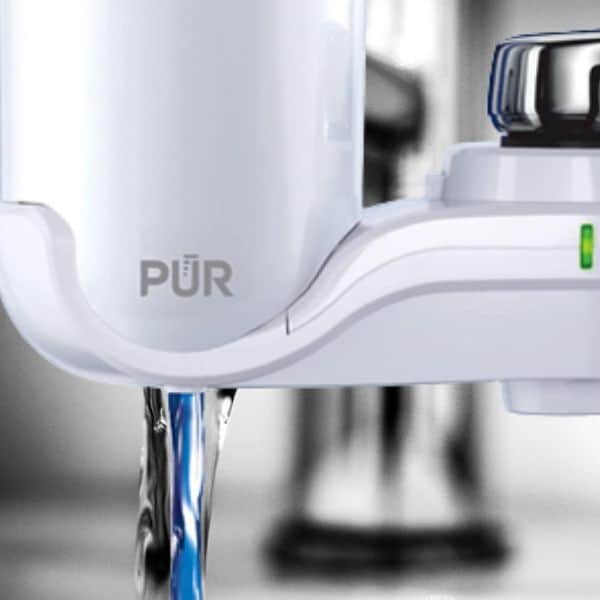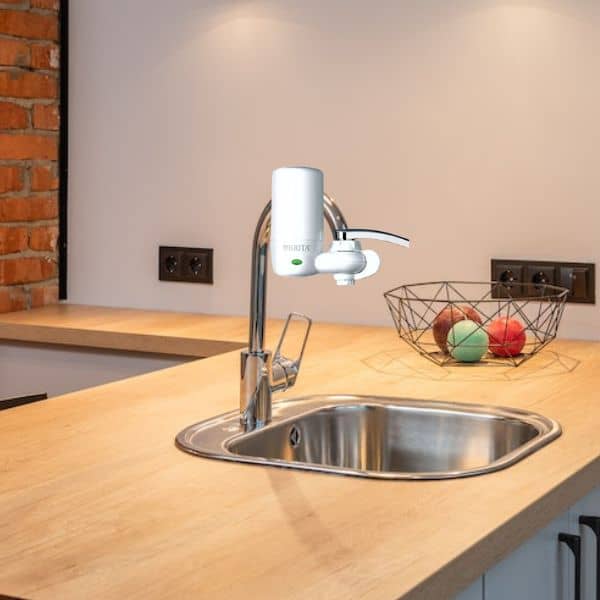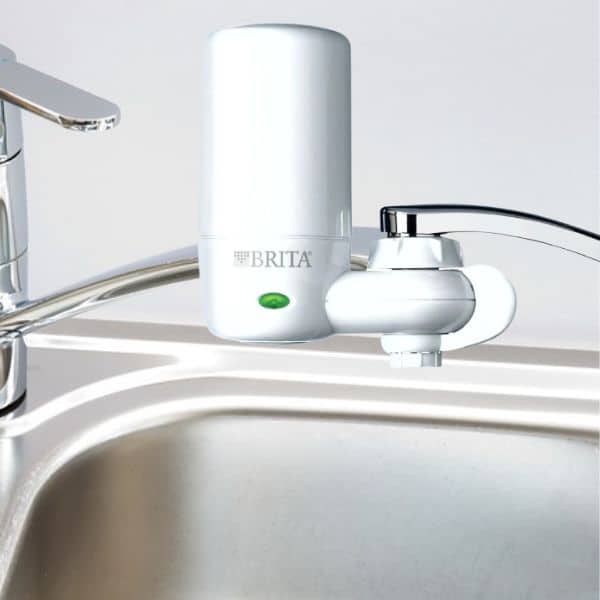What Are Faucet Mount Filters, and How Do They Work?
Faucet mount filters are effective water filtration systems that can easily be attached to your kitchen faucet. These devices work by filtering out impurities as water flows through the filter. By removing contaminants such as chlorine, lead, and other chemicals, these filters provide clean and safe drinking water for you and your family.

What Contaminants Does Faucet Mount Filter Remove?
Here’s a breakdown of some common contaminants that faucet-mounted filters can help eliminate:
Sediments
Sediments in tap water are often caused by rust or other particles that can make your water look cloudy or dirty. So, faucet mount filters attach directly to your faucet and use activated carbon filters to reduce sediment, chlorine taste and odor, and other impurities that can impact the quality of your drinking water.
The filter forces the water through layers that trap the contaminants. As the water passes through the filter, sediments like sand, rust, and dirt are caught in the outermost layer. The next layer is composed of activated carbon which removes chlorine and other chemicals that affect taste and odor.
Chlorine
Chlorine is often added to tap water as a disinfectant but can have an unpleasant taste and smell. Faucet mount filters use activated carbon technology to reduce the amount of chlorine in your water.
The faucet water filter works by using activated carbon, which is derived from coconut shells, wood, or coal. When water passes through the filter cartridge, the activated carbon attracts and traps impurities like chlorine and other contaminants. This process ensures that your drinking water tastes clean and fresh.
Heavy Metals
Heavy metals such as lead, mercury, and cadmium can cause serious health problems if consumed regularly over time. Fortunately, faucet water filters are an affordable and effective solution for removing these contaminants.
The faucet mount water filter uses a combination of activated carbon and ion exchange resin to trap heavy metals before they reach your glass or bottle. The activated carbon attracts impurities while the resin exchanges ions with the water molecules, removing any particles too small for the carbon to capture. This process ensures you get clean, filtered water every time you turn on your faucet.

Volatile Organic Compounds
Faucet mount filters are an easy and affordable way to ensure your drinking water is safe and pollutants-free. One pollutant that faucet mount filters can remove is Volatile Organic Compounds (VOCs).
VOCs are a group of chemicals that can be found in many household products, including cleaners, cosmetics, and pesticides. They can also be present in tap water due to industrial pollution or agricultural runoff. VOC exposure has been linked to several health problems, including respiratory issues, headaches, and cancer. Fortunately, faucet mount filters with activated carbon technology can effectively remove VOCs from your drinking water.
The activated carbon technology used in faucet mount filters attracts the VOC molecules to their surface through adsorption.
Pesticides
Pesticides are chemicals used in agriculture to protect crops from insects and other pests. While they serve a valuable purpose in farming, they can pose health risks when consumed through drinking water. Many municipal water treatment plants do not remove all pesticides from tap water, leaving consumers vulnerable to potential health hazards.
Faucet mount filters with activated carbon technology can remove pesticides from your drinking water. In addition to removing pesticides, faucet mount filters can also improve taste and odor by reducing impurities that affect the flavor of the water. They are an affordable way to ensure you can access safe drinking water in your home without relying on potentially harmful chemicals or pollutants.
Pharmaceutical Residues
Faucet mount filters have become popular for households to ensure clean and safe drinking water. However, with the rise of pharmaceutical residues in our water supply, the role of these filters has become even more crucial. Studies have shown that tap water can contain traces of antibiotics, hormones, and other drugs, posing serious health risks.
Faucet mount filters use activated carbon technology to remove impurities from tap water, including pharmaceutical residues. Activated carbon acts like a sponge that absorbs contaminants. It is an effective method for removing chemical compounds from water because it has a large surface area that attracts pollutants.

Benefits of Faucet Mounted Filters
If you need to get pure, clean water, you need a water filtration system like a faucet filter. By using faucet filters, you can be confident that you drink clean and safe water. Here are some benefits of using faucet filters.
Efficient Water filtration
One of the biggest benefits of faucet filters is that they are extremely efficient at removing impurities from your drinking water. These impurities can include chlorine, lead, fluoride, and other harmful contaminants that can affect the taste and quality of your tap water. Faucet filters use activated carbon technology to remove these impurities, so you get clean and fresh-tasting water every time you turn on your faucet.
More economical than whole-house water filters
Another significant benefit of using faucet filters is that they are more economical than whole-house water filters such as reverse osmosis systems. This is because, with a faucet filter, you only need to filter the water you consume.
Faucet mounted filters are much more affordable than whole-house water filters, which require more maintenance and cost hundreds or even thousands of dollars. Additionally, since you’re only filtering the water from your taps, you don’t have to worry about filtering large amounts of water you won’t be using.
Provide water on demand
Faucet water filter is a great addition to any household for several reasons, but one of the most significant benefits is that they provide water on demand. With a faucet filter installed on your kitchen sink, you no longer have to wait hours for drinking water to chill in the fridge or go through the tedious boiling process.

Are Faucet Filters Effective?
Faucet filters are becoming popular for their ability to remove impurities from tap water. However, the question remains: Are faucet filters effective? The answer is yes; they are highly effective in removing contaminants such as lead, chlorine, and bacteria.
Faucet mounted filters use a combination of activated carbon and other filtering materials to trap and remove impurities from tap water. Activated carbon has been proven effective in reducing chlorine levels, which can cause a bad taste and odor in water. Additionally, faucet filters can remove lead particles that may be present in old pipes or plumbing systems.
It’s important to note that not all faucet filters are created equal, so it’s essential to choose one that meets your specific needs.
Conclusion
Faucet water filter is an affordable and easy way to improve tap water quality. They can reduce up to 99% of contaminants, making your water taste healthier. These filters are more economical than whole-house water filters. However, it’s important to remember that not all faucet filters are created equal in performance. Be sure to do your research and choose one that meets your standards for quality and safety.

